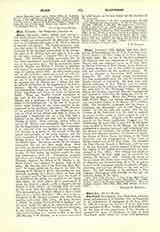

Blanchard (DUCHESNE), JEAN-BAPTISTE, a French Jesuit and educator, b. October 12, 1731, at Tourteron in the department of Ardennes; d. June 15, 1797. In 1746 he entered the Society of Jesus, and later was professor at Metz, Verdun, and Pont-a-Mousson. At the time of the suppression of the Society he changed his name of Duchesne to that of Abbe Blanchard, under which his works were published. He left the order, however, in 1762, before it was suppressed, retired to Belgium, and for seven years remained near Namur, occupied with pedagogical questions. He wrote “Le temple des Muses fabulistes” (Liege, 1776, 2 vols.) and “l’Ecole des mceurs” (Namur and Paris, 1775, 2 vols.). The latter work was first published without the author’s name under the title, “Le poete des mceurs, ou les maximes de la sagesse” (1771), and later was reprinted several times with the title “Maximes de l’honnete homme, ou le poete des mceurs”. Blanchard’s main work was published after his death by Bruyset: “Preceptes pour l’education des deux sexes k l’usage des families chretiennes” (Lyons, 1803, 2 vols.); a new edition in 1807 was entitled “Education chretienne l’usage de Fun et de l’autre sexe”. Blanchard adapts to Christian education the principles found in Rousseau’s “Emile”. In the work there is little originality; yet, besides judiciously chosen quotations, we find very useful suggestions and good criticisms of Rousseau’s views. It is divided into three parts: physical education, moral education, and education of girls. Great importance is attached to physical culture, health, hygiene of the whole organism, and of the special sense-organs. Useful rules are given for the formation of the intellect, feelings, and will. Good pronunciation and reading are insisted on. Blanchard rightly rejects the principle of negative education advocated by Rousseau. It would be very harmful to wait till reason is developed in order to make the child exercise it; on the contrary, it must be developed by proper exercise and under proper guidance. To start for a long journey, he says, the traveller does not wait till the sun is high in the sky, but rather profits by the first rays of light; so must it be with the child. As to the education of women, Blanchard’s views seem rather narrow today. Woman is made for dependence. Her instruction must be limited to a few elementary notions; Fenelon’s principles and the “Avis d’une mere sa fille” of Madame de Lambert, which Blanchard reproduces, must form the basis of her moral education.
C. A. DUBRAY

